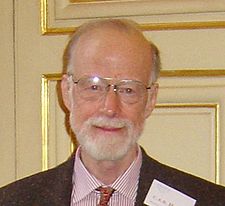C. A. R. Hoare
From Wikipedia, the free encyclopedia
| This article may require copy-editing for grammar, style, cohesion, tone or spelling. You can assist by editing it now. A how-to guide is available. (August 2008) |
| Sir Charles Antony Richard Hoare | |
 |
|
| Born | 11 January 1934 Colombo, Sri Lanka |
|---|---|
| Fields | Computer Scientist |
| Institutions | Elliott Brothers Queen's University of Belfast Oxford University Moscow State University Microsoft Research |
| Alma mater | Oxford University Moscow State University |
| Doctoral students | Stephen Brookes Cliff Jones David Naumann Bill Roscoe William Stewart |
| Known for | Quicksort Hoare logic CSP |
| Notable awards | ACM Turing Award |
Sir Charles Antony Richard Hoare (born 11 January 1934), commonly known as Tony Hoare or C.A.R. Hoare, is a British computer scientist, probably best known for the development in 1960 of Quicksort (or Hoaresort), one of the world's most widely used sorting algorithms. He also developed Hoare logic for verifying program correctness, and the formal language Communicating Sequential Processes (CSP) used to specify the interactions of concurrent processes (including the Dining philosophers problem) and the inspiration for the Occam programming language.
Contents |
[edit] Biography
Born in Colombo (Ceylon, now Sri Lanka) to British parents, he received his Bachelor's degree in Classics from the University of Oxford (Merton College) in 1956. He remained an extra year at Oxford studying graduate-level statistics, and following his National Service in the Royal Navy (1956–1958). When he learned to speak Russian, he studied computer translation of human languages at Moscow State University in the Soviet Union in the school of Kolmogorov.
In 1960, he left the Soviet Union and began working at Elliott Brothers, Ltd, a small computer manufacturing firm, where he implemented ALGOL 60 and began developing algorithms in earnest.[1] He became a Professor of Computing Science at the Queen's University of Belfast in 1968, and in 1977 moved back to Oxford as a Professor of Computing to lead the Programming Research Group in the Oxford University Computing Laboratory, following the death of Christopher Strachey. He is now an Emeritus Professor there, and is also a senior researcher at Microsoft Research in Cambridge, England.
The famous quote, "We should forget about small efficiencies, say about 97% of the time: premature optimization is the root of all evil", by Donald Knuth,[2] has also been attributed to him (by Knuth himself),[3] although Hoare disclaims having coined the phrase.[4]
[edit] Awards
- He received the 1980 ACM Turing Award for "his fundamental contributions to the definition and design of programming languages". The award was presented to him at the ACM Annual Conference in Nashville, Tennessee, on 27 October 1980, by Walter Carlson, Chairman of the Awards committee. A transcript of Hoare's speech was published in Communications of the ACM.[1]
- Harry H. Goode Memorial Award in 1981
- In 1982 he was elected Fellow of the Royal Society
- On December 18th, 1987, he was awarded an Honorary Doctorate of Science by the Queen's University Belfast.
- In 2000 he was knighted for services to education and computer science.
- In 2000 he was awarded the Kyoto Prize for Information Science.
- In 2005 he was elected Fellow of the Royal Academy of Engineering
- On Oct 13, 2006, the Computer History Museum (CHM) in Mountain View, California inducted him as Fellow of the Museum "for development of the Quicksort algorithm and for lifelong contributions to the theory of programming languages".
- He received an Honorary Doctorate of Science from the Department of Informatics of the Athens University of Economics and Business (AUEB) on September 24th, 2007, in Athens, Greece.
[edit] Books
- O.-J. Dahl, E. W. Dijkstra and C. A. R. Hoare (1972). Structured Programming. Academic Press. ISBN 0-12-200550-3. OCLC 23937947.
- C. A. R. Hoare (1985). Communicating Sequential Processes. (available online at http://www.usingcsp.com/ in PDF format). Prentice Hall International Series in Computer Science. ISBN 0-13-153271-5 hardback or ISBN 0-13-153289-8 paperback.
- C. A. R. Hoare and M. J. C. Gordon (1992). Mechanised Reasoning and Hardware Design. Prentice Hall International Series in Computer Science. ISBN 0-13-572405-8. OCLC 25712842.
- C. A. R. Hoare and He Jifeng (1998). Unifying Theories of Programming. Prentice Hall International Series in Computer Science. ISBN 0-13-458761-8. OCLC 38199961.
[edit] References
- ^ a b C.A.R. Hoare (February 1981). "The emperor's old clothes" (PDF). Communications of the ACM 24 (2): 5–83. doi:. ISSN 0001-0782. http://portal.acm.org/citation.cfm?id=358561.
- ^ Knuth, Donald: Structured Programming with Goto Statements. Computing Surveys 6:4 (1974), 261–301.
- ^ The Errors of Tex, in Software—Practice & Experience, Volume 19, Issue 7 (July 1989), pp. 607–685, reprinted in his book Literate Programming (p. 276)
- ^ Tony Hoare, a 2004 email
[edit] External links
| Wikiquote has a collection of quotations related to: C. A. R. Hoare |
- Microsoft home page — short biography
- Oral history interview with C. A. R. Hoare at Charles Babbage Institute, University of Minnesota, Minneapolis.
- Oxford University Computing Laboratory home page — Emeritus Professor of Computing
- Advice for Ph.D. students from Tony Hoare — held at the International Summer School Marktoberdorf 2006
- C. A. R. Hoare bibliography in the DBLP database
- The classic article on monitors — The original article on monitors that was republished as a classic of the ACM
|
|||||
| Persondata | |
|---|---|
| NAME | Hoare, Charles Antony Richard |
| ALTERNATIVE NAMES | |
| SHORT DESCRIPTION | Computer Science |
| DATE OF BIRTH | 11 January 1934 |
| PLACE OF BIRTH | Colombo, Sri Lanka |
| DATE OF DEATH | |
| PLACE OF DEATH | |

